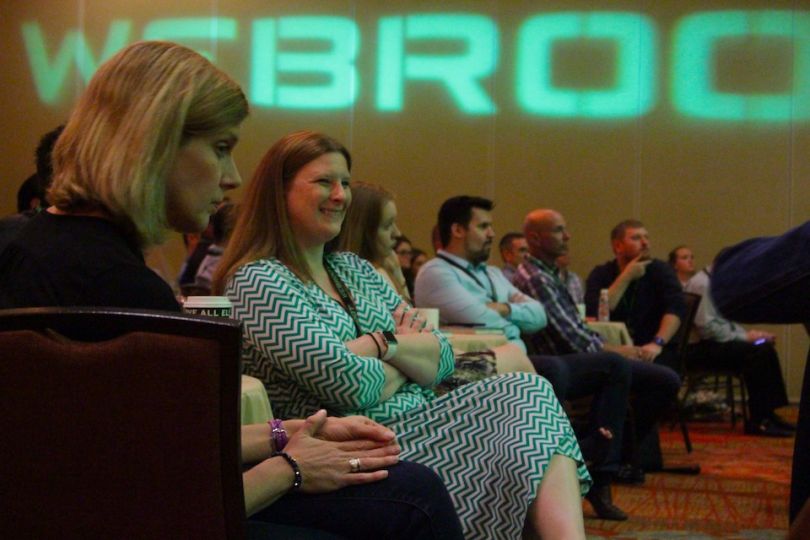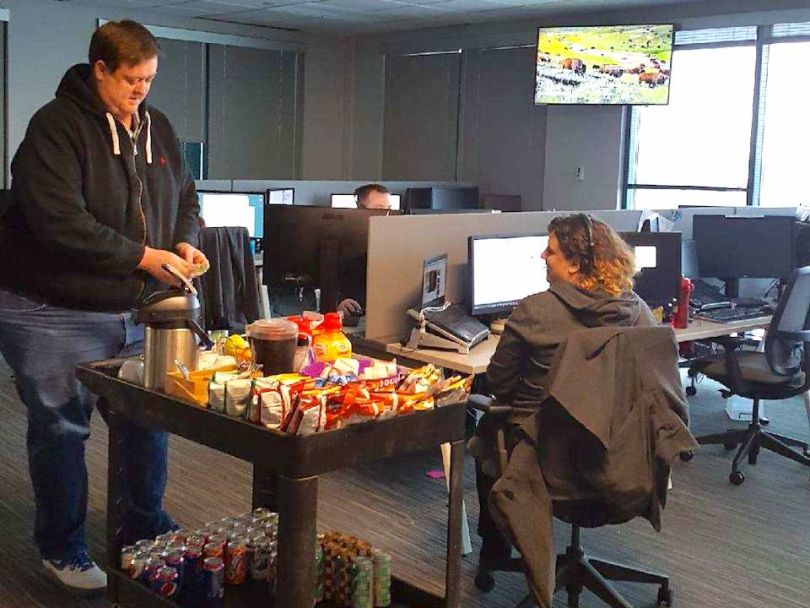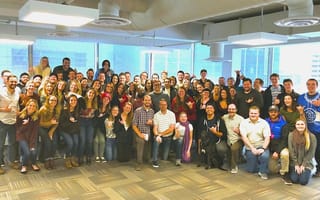Every startup dreams of becoming a successful, thriving, high-growth operation, but few are prepared for the growing pains that come with it. Scaling — and scaling fast — can create a number of challenges, from maintaining a strong culture to simply finding enough talent to meet accelerating demand.
We talked to five local tech companies about the lessons they learned as they scaled and how they came out stronger (and bigger) in the end.

Bootstrapped success story FareHarbor has more than doubled the size of its team in the last year — and plans to double it again in the next two. Chief of staff Ted Clements talked about the changes the company’s seen since its founding in 2013.
Can you share some stats on your recent growth as a company?
In the past 90 days, we’ve hired more than 30 employees in our Colorado Office, more than 20 employees in our other offices, and our overall headcount has more than doubled since January of 2017. Our growth isn’t slowing down, and we now have over 6,000 clients in more than 30 countries.
What has been the greatest challenge you've experienced as you've scaled?
As we’ve grown, one of the greatest challenges we’ve experienced has been formalizing our employee training program and overarching internal processes to best serve our clients while ensuring every new hire understands where we started, where we are headed and how to live our company values.
How has your company culture evolved as you've added new members to the team?
In terms of culture, we need to think beyond traditional perks like providing beer on Fridays and daily team lunches. In such a fast-paced environment, we want to ensure that the best ideas have room to blossom in a setting where teams continuously collaborate to improve our product and the suite of services we offer our clients. In order for this to happen, we encourage employees who have great ideas to step up and act on them. In our dynamic culture, we want people who are eager, impatient and hungry to build on the progress we have made. Hiring the right people has been, and will continue to be, critical to our growth in 2018.
Flowhub's business management platform helps cannabis companies track and handle everything from growing to compliance to retail. Chief of staff Brandon Hickman gave us some insight into how they've met increasing demand without sacrificing their culture.
Can you share some stats on your recent growth as a company?
Flowhub has grown from a handful of developers to over 20 employees since we entered the market mid-2016. In that time, we’ve garnered over 30 percent of the market share in Colorado, grown recurring revenues by over 800 percent, and expanded from Colorado markets into Alaska, California, Maryland, Michigan, Nevada and Oregon. We also have expanded from one software offering to two, Flowhub Retail and Flowhub Grow.
What has been the greatest challenge you've experienced as you've scaled? How have you overcome it?
The greatest challenge Flowhub has worked through is managing the demand for our products. Hypergrowth is a tricky beast to tame. The processes and workflows that work when you’re a small software company don’t always translate when you ramp up your customer count 10 times.
The best way to manage that growth is to fail quickly and recover fast. In an emerging industry with ever-shifting regulation, the players who are able to pivot the fastest are going to see the most success.
How has your company culture evolved as you've added new members to the team?
Adding employees and growing as a company can lead to major cultural changes, for better or worse depending on how they’re mitigated. Flowhub has done a great job of managing its growth and maintaining a tight-knit culture where radical transparency, enthusiasm for our customers and our products, taking ownership, expecting excellence from each other and pushing the status quo lead all of our actions. Celebrating the small wins, encouraging employees to have fun at the right time and the occasional GIF response in Slack keep things positive around the office.

Cybersecurity company Webroot has seen tremendous growth in recent years, adding 250 new members to its team in 2017. VP of human resources Melanie Williams explained how they navigated the unique challenges of scaling in a competitive tech community.
Can you share some stats on your recent growth as a company?
Webroot has undergone explosive growth over the past few years. As a business, we experienced 11 percent year-over-year overall recurring revenue growth last fiscal year and our business segment grew 28 percent during that same time period. Alongside this growth, our workforce has also expanded. We’ve experienced 20 percent growth of our workforce since 2016.
What has been the greatest challenge you've experienced as you've scaled? How have you overcome it?
The “war for talent.” The secret is out. Silicon Valley is figuring out what we’ve known for decades: the Front Range, particularly the US-36 corridor, is a great place to live with a strong talent pool.
With most of the big tech companies already moved or moving in, it’s putting additional pressure on hiring for those of us who have called Colorado home for a long time. This area has been competitive since I started my HR career as a technical recruiter in 1997. While I can’t say we’ve overcome the challenge, it is consistently on our minds and part of our conversations even at the executive level. We constantly assess our employee value proposition and benefits package to support our growth and to retain the amazing talent we already have on board. Some updates we’ve made are to enhance our training and development programs as well as create innovative benefits like student loan assistance.
How has your company culture evolved as you've added new members to the team?
Staying true to your culture is one of the hardest things to do during high growth. Corralling the power of more than 600 employee experiences, opinions and ideas has meant focusing on maturing our processes and improving communications. We now have to be more deliberate about how things get done and ensure everyone is clear on the strategy, objectives and how their own work affects the big picture. It’s the only way to be successful both collectively and individually.

OpenTable’s online reservation system and review platform connect diners with restaurants all over the world, and they like to feel that same connection as a team. Director of customer support Matthew Caron and support manager Randy Abbott shared how the company has maintained a tight-knit family atmosphere, even as it's scaled.
Can you share some stats on your recent growth as a company?
Here at OpenTable we have seen a lot of growth throughout both of our offices. Our Denver support office just brought in a team of 17, including a new supervisor. We are also really excited to bring in a new team in mid-March as well. In the past 90 days, we have seen seven promotions within our support team, four of which have been from our support office to our sales office.
What has been the greatest challenge you've experienced as you've scaled? How have you overcome it?
Growth always identifies better ways to support our customers and our employees. We ask our employees to be a part of the solution and be transparent about our opportunities and successes. We learn and adapt as each team grows, seek out process improvements and correct course as needed. Even if a process has always been done a certain way, as needs change the process may need to change as well. We try to be open to it, gather feedback from those involved, and not be afraid to try something new.
How has your company culture evolved as you've added new members to the team?
We are a family, and our culture has only gotten stronger as we increase in size. It’s important not to lose that family mentality, so we start and end each day with a hello and handshake to everyone. More team members mean more people to bounce ideas off, different points of view and different mindsets, which means a more well-rounded organization.

Fintech company Personal Capital had a big year in 2017, raising $40 million in new capital. Luke Samuels, sales associate team lead, told us how the company keeps culture fresh, even as it matures.
Can you share some stats on your recent growth as a company?
Personal Capital experienced continued growth throughout 2017, in many positive ways. Last year we were successful in growing our assets under management to $6.1 billion. We also revamped the look and feel of our dashboard, released new products, expanded our advisory presence nationwide, and put a plan in place to open two new offices in Dallas and Atlanta in 2018.
All of our teams grew — some as much as 50 percent — and we saw more internal promotions than any other year.
What has been the greatest challenge you've experienced as you've scaled? How have you overcome it?
Our culture is valued by everyone at Personal Capital. When a company experiences growth — whether it be rapid or steady — keeping that culture original, healthy and enjoyable can sometimes get lost in the fray.
We have made it a point to devote our time and energy into maintaining and developing this culture. We want to ensure that every employee enjoys coming to work. We’ve gotten creative in the ways that we recognize people, motivate teammates and celebrate together.
How has your company culture evolved as you've added new members to the team?
We try to maintain a startup feel, even though we are no longer a small team. We have off-site events for the whole company, summer baseball games and monthly celebrations. We’ve also implemented weekly team building exercises, round-table discussions to improve skills, and monthly competitions rewarded with things like Avalanche tickets, escape rooms and other off-site activities. We stay connected in a variety of ways.




